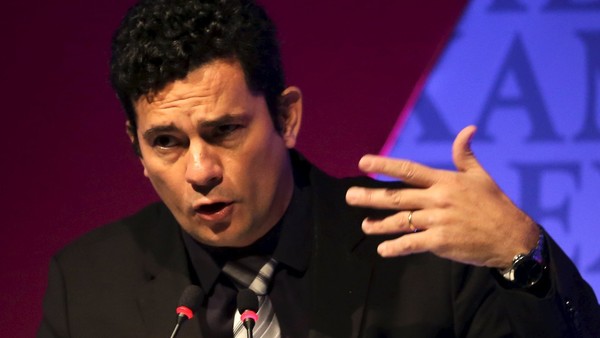September 1, 2015 5:25 pm
The Brazilian judge at the centre of the investigation into widespread corruption at Petrobras has been rallying public support for the probe just as the impact on the economy from the scandal is starting to become clearer.
In a series of events in São Paulo in recent days where he received rapturous receptions, Sérgio Moro called on the public to continue supporting the Petrobras investigation and insisted that corruption was the real danger to the economy, not its prosecution.
“Confronting systematic corruption will bring significant gains for all of us, for companies and for the economy in general,” he said at a conference of business executives on Monday. “The cost of systematic corruption is extraordinary.”
The relatively rare public appearances by Mr Moro, a 43 year-old federal judge in the southern city of Curitiba who has become a national hero because of his role in the probe into Petrobras, come at a delicate moment for the case with political opposition starting to grow.
His visit to São Paulo followed the publication on Friday of second-quarter GDP figures that showed a collapse in investment, which is partly the result of the impact of the corruption probe into deep-seated corruption at Petrobras, the largest industrial company in Brazil. The economy declined by 1.9 per cent in the second quarter, while fixed investment fell 8.1 per cent.
The political temperature surrounding the Petrobras probe has also risen after the filing 10 days ago of the first indictments of leading politicians, including speaker of the lower house of Congress, Eduardo Cunha. Unlike the business executives who are being tried by Mr Moro in Curitiba, the cases against elected politicians are taken out of his hands and transferred to the country’s supreme court in Brasília.
With the discovery of new oilfields and greater emphasis on state-led economic development, Petrobras has come in recent years to play a much larger role in the economy. However, the arrest of a series of executives from Petrobras and construction companies it works with have brought some of its projects to a halt. The company’s latest long-term plan for 2015-2019 included a 37 per cent cut in investment from its previous forecast.
A recent study by GO Associados, a São Paulo consultancy, calculated that the economic impact from the Petrobras corruption scandal over the next few years — including reduced investment by the company, construction activity and jobs — will amount to R$142.6bn, which is equivalent to 2.5 per cent of GDP.
The cost of systematic corruption isextraordinary
- Sérgio Moro
José Roberto Mendonça de Barros, a prominent Brazilian economist, said the impact from the corruption probe was hard to calculate because Petrobras would be suffering anyway as a result of oil prices falling to $40. “Petrobras is now effectively being run by its finance director,” he said, in reference to the huge constraints it is now operating under. “Any company being run by its finance director is facing a lot of problems.”
In his speech on Monday, which won a standing ovation, Mr Moro rejected the suggestion that the Petrobras corruption cases were the cause of the sharp economic downturn in Brazil. “The policeman who discovers a crime is not to blame for the corpse,” he said.
The elaborate system of bribes surrounding the company, which prosecutors estimate to be worth about $2bn, was one reason Petrobras had made a series of disastrous investment decisions in recent years. “If economic agents do not have confidence that they can compete on equal terms for public contracts, if there is a grey zone of bribe payments, then that impacts the functioning of the market,” he said.

The economy officially slipped into recession in the second quarter as high inflation, falling consumer confidence and a roiling corruption scandal led GDP to contract 1.9 per cent from the previous quarter.
Amid the interconnected political and economic crises that the country is suffering, one of the few things that many Brazilians have been able to take pride in has been the corruption investigation and the arrest of senior figures once thought untouchable.
Mr Moro is the public face of the probe, but he has been working with a group of young prosecutors in Curitiba, many in their 30s and many educated in the US, who have openly declared their intent to break the air of impunity that has long surrounded corruption cases in Brazil.
At times, Mr Moro appeared to be directly rebutting Dilma Rousseff, Brazil’s embattled president. In June, she questioned the use of plea bargains to secure confessions — a new practice in Brazilian justice — comparing them to the 18th century ‘Minas Gerais Conspiracy’, a secret campaign against Portuguese colonial rule that was brought down by an informant.
“Plea bargains are betrayal, but they are a betrayal among criminals,” Mr Moro said on Saturday at a legal conference. “No one here is betraying the Minas Gerais Conspiracy.”
Mr Moro said that one of the models for the Petrobras inquiry was the ‘Clean Hands’ investigation in Italy in the early 1990s that exposed widespread corruption among politicians and businessmen. He said that the investigation had not been more successful in reducing corruption in Italy because of a “counter-reform” of new laws under prime minister Silvio Berlusconi, that included an amnesty for various white-collar crimes.
Copyright The Financial Times Limited 2015. You may share using our article tools.
Please don't cut articles from FT.com and redistribute by email or post to the web.
Please don't cut articles from FT.com and redistribute by email or post to the web.


No comments:
Post a Comment